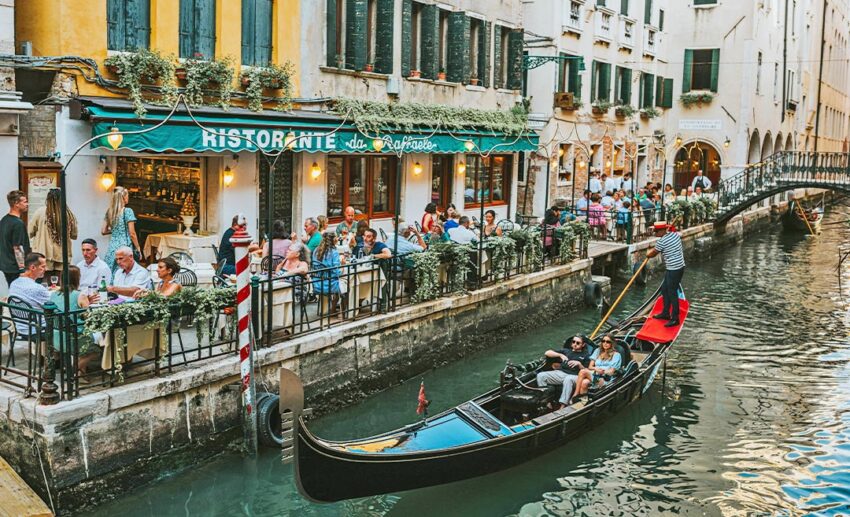Amidst the allure of picturesque and charming cities in Europe, lies a less enchanting reality for every tourist — tourist scams! Do remember that while most European cities are undoubtedly safe to explore for female travellers, it is important to familiarise yourself with the most prevalent scams before your next trip.
Always stay alert and be a savvy traveller by avoiding these 10 most common scams happening across different European cities.
1. Distraction thefts
One of the most common scams happening in most European countries involves a distraction tactic where scammers will divert your attention. They may accidentally spill something on you or approach you to have a friendly conversation. While the scammer offers assistance with cleaning or directs your gaze elsewhere, an accomplice will attempt to steal your belongings.
Another common distraction theft method that commonly occurs in Italy is sellers purposely placing paintings on the ground in the middle of crowded places. You might accidentally step on it, and the seller will seek sympathy to compensate for supposed damaged artwork. Simply ignore and walk away in this case scenario.
2. Pick pocket
The viral ‘Attenzione, Pickpocket’ video circulating on social media serves as a reminder that pick pocketing is still very common throughout Europe.
Nowadays, pickpocketing operates in groups, with at least two individuals in cahoots. They will often disguise themselves as tourists or even carry luxury shopping bags to blend in seamlessly.
When walking in crowded places, keep your bags in front at all times. If you sense a group of people getting too close, turn around quickly to check your belongings.
To protect yourself from pickpocketing, use a bag with secure closure and avoid carrying a large amount of cash.
3. Free friendship bracelets
Be wary of individuals offering free friendship bracelets when you are out and about, particularly when in France or Italy.
These seemingly friendly individuals may offer to place a friendship bracelet on your hand or hand you a rose for free. Once you accept it, they will then attempt to win your sympathy by sharing a sad story about their family member and showing pictures of their children.
Politely decline and walk away to avoid being pressured into making a donation.
4. Donation scams
Another common ongoing scam in Europe sees individuals pretending to be deaf to collect donations to help support the deaf community.
These scammers tend to dress in regular attire, holding clipboards and pens, asking you to pledge a small donation. Many locals have warned not to participate in these donations as the organisations listed do not exist.
Generally, be cautious when approached by strangers seeking donations. Instead, consider donating to established charitable organisations so you know where your funds are heading.
5. Fake gold rings
The fake gold ring scammer is becoming common in cities like Prague. You may encounter a scammer driving in a luxury car, stopping by to ask for help as they are running out of petrol and lack cash in hand.
To gain your trust, they will show off their business cards and offer a gold ring as collateral. These gold rings are fake.
Never accept the gold ring or any jewellery, politely decline, and do not engage in the conversation any further.
6. Helpful local at the train station

When navigating train stations, particularly in Portugal or Spain, be cautious of friendly locals offering unsolicited help with purchases by the ticket machine.
While they may seem friendly and helpful in the beginning, they often expect tips in return for their assistance. Always decline assistance from strangers, unless they are uniformed staff.
If you find the ticket machine confusing, it’s best to purchase tickets directly at the counter or purchase the ticket online instead.
7. ATM scams
When using ATMs in Europe, be cautious of the hidden fees and card skimmers placed on card slots to steal your information.
When withdrawing cash, look out when prompted for which currency to be billed, either in your card’s origin currency or the local currency. Always decline the conversion option and opt for the local currency to avoid failing for their ridiculous high conversion rate.
Tip: In most major European cities, card payments are widely accepted. Minimise the need for cash by using a prepaid debit or credit card instead.
8. Restaurant scams

While indulging in local cuisine is a highlight of travel, it can also turn into a nightmare. Many restaurants often take advantage of tourists who do not understand the local language.
The most common restaurant scams include a menu with no prices listed, not giving a breakdown receipt of your order, charging for a basket of bread without mentioning it is not complementary, or serving expensive food items you didn’t order.
Steer clear of these tourist trap restaurants by checking out restaurant reviews beforehand. However, beware of fake Google reviews too, because some establishments resort to purchasing bulk of fake reviews online to deceive potential diners.
9. Taxi scams
Even with tamper-proof metres in cities such as London, Paris, Amsterdam, and Barcelona, taxi drivers still find ways to trick tourists by charging night or weekend rates during the day or avoid using metres and charge a fixed fee.
To avoid these taxi scams, opt for established taxi companies with logos, or look out for the distinct taxi plate colours which often differ from personal car plates in various European cities.
If you’re unsure of the metre price system, don’t hesitate to ask the taxi driver to explain, so you can get the rough estimated price up front.
10. Money conversion scam

When exchanging currency, be cautious of misleading rates and hidden fees at exchange offices. Some exchangers will display the selling rate instead of buying rate, tricking you to think it is a favourable conversion.
Stick to established and reputable money changers and always check Google reviews for assurance. Before exchanging, check the current rates online and compare them with the displayed buying rate at the money changer. Of course, only proceed only if the rates align closely!



